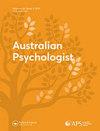She is like me: a qualitative exploration of body image ideals and the young woman psychologist working with eating disorders
IF 2
4区 心理学
Q2 PSYCHOLOGY, MULTIDISCIPLINARY
引用次数: 0
Abstract
ABSTRACT Objective Women who are early career psychologists are likely to share a range of similarities with clients experiencing eating disorders including societal body image ideals and their own eating disorder history. While lived experience may strengthen their capacity to empathise with the client, it may also place the psychologist at risk of overidentification with the client if sufficient supports and training are not provided. This qualitative study explored the experiences of women who are early career psychologists working with eating disorders. Method Seven early career women psychologists working in Australia with clients experiencing eating disorders participated in semi-structured interviews in relation to the impact of body image ideals on their work and how they utilise supervision around this issue. Results Interpretative Phenomenological Analysis of interview data revealed that several participants believed they had received inadequate training in preparing them to work with clients experiencing eating disorders. Though participants with lived experience believed their capacity for empathy was enhanced, findings indicated that similarities between clients and psychologists also created vulnerability to overidentification with the client, the triggering of their own body image issues, and experiences of shame in supervision and the workplace. Conclusions Training and supervision implications, and future research recommendations are discussed. KEY POINTS What is already known about this topic: Therapists with a personal eating disorder history are likely to choose to work with eating disorders, which can present both advantages and challenges in their work. Young therapists often share a range of similarities with clients living with an eating disorder. Trainee counsellors can experience shame about personal body image or eating disorder history which prevents them from disclosing in supervision. What this topic adds: Results suggest that some young women psychologists with their own eating disorder history or body image issues can be required to take on eating disorder heavy caseloads. Though there are advantages in the development of empathy and the therapeutic relationship, these practitioners seem prone to overidentification with the client with eating disorders, boundary transgressions, and worsening of their own eating disorder symptoms. Despite clinical supervision being the primary support to manage issues of overidentification, study participants with their own eating disorder history or significant body image issues tended not to disclose this in supervision when discussing eating disorder cases.她和我一样:对身体形象理想进行定性探索,是研究饮食失调的年轻女性心理学家
摘要目的作为早期职业心理学家的女性可能与经历饮食失调的客户有一系列相似之处,包括社会身体形象理想和她们自己的饮食失调史。虽然生活经验可能会增强他们与客户共情的能力,但如果没有提供足够的支持和培训,心理医生也可能面临过度认同客户的风险。这项定性研究探讨了从事饮食失调早期职业心理学家的女性的经历。方法七名在澳大利亚工作的早期女性心理学家与患有饮食失调的客户一起参加了半结构化访谈,了解身体形象理想对她们工作的影响,以及她们如何利用监督来解决这个问题。结果对访谈数据的解释性现象学分析显示,一些参与者认为他们在准备与患有饮食失调的客户合作方面接受的培训不足。尽管有生活经验的参与者认为他们的同理心能力得到了增强,但研究结果表明,客户和心理学家之间的相似性也会导致他们容易过度认同客户,引发自己的身体形象问题,以及在监督和工作中的羞耻感。结论讨论了培训和监督的意义,以及未来的研究建议。关键点关于这个话题的已知情况:有个人饮食障碍病史的治疗师可能会选择治疗饮食障碍,这在他们的工作中既有优势,也有挑战。年轻的治疗师经常与患有饮食失调的客户有很多相似之处。实习辅导员可能会对个人身体形象或饮食失调史感到羞耻,这使他们无法在监督中披露。本主题补充道:研究结果表明,一些有饮食失调史或身体形象问题的年轻女性心理学家可能会被要求承担饮食失调的大量案件。尽管移情和治疗关系的发展有好处,但这些从业者似乎倾向于过度认同饮食失调、越界和自身饮食失调症状恶化的客户。尽管临床监督是处理过度识别问题的主要支持,但有饮食障碍病史或重大身体形象问题的研究参与者在讨论饮食障碍病例时,往往不会在监督中披露这一点。
本文章由计算机程序翻译,如有差异,请以英文原文为准。
求助全文
约1分钟内获得全文
求助全文
来源期刊

Australian Psychologist
PSYCHOLOGY, MULTIDISCIPLINARY-
CiteScore
3.70
自引率
5.30%
发文量
32
期刊介绍:
The Australian Psychologist is the official applied practice and public policy journal of the Australian Psychological Society. As such, the journal solicits articles covering current issues in psychology, the science and practice of psychology, and psychology"s contribution to public policy, with particular emphasis on the Australian context. Periodically, Australian Psychological Society documents, including but not limited to, position papers, reports of the Society, ethics information, surveys of the membership, announcements, and selected award addresses may appear in the journal.
 求助内容:
求助内容: 应助结果提醒方式:
应助结果提醒方式:


